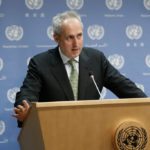By George Mangula
Uganda must adopt the use of irrigation and fertilizers on large scale if the country is to have enough food for consumption and sale, Alhaji Momodou Jallow, the FAO Representative in Uganda, has said.
Mr Jallow echoed the statement as he addressed participants attending a meeting to discuss how best Uganda can be food sufficient against the forces of drought and pests such as the fall armyworm.
Jallow’s warning comes at the time when Uganda is battling the effects of the recent prolonged drought that left most regions with inadequate food, leading to sharp increases in food prices.
The UN official said it was high time Uganda avoided dependence on rainwater and instead adopt all kinds of irrigation to farm, citing Israel, a desert country that has used irrigation for decades to produce food for domestic and export purposes.
He added that fertilizer application was also necessary to replenish soils with nutrients like nitrogen, phosphorus and potassium that all lead to high crop yields.
His call was re-echoed by Bolton Uganda’s Agnes Kabwisho, who advised the government of Uganda and commercial farmers to emulate neighbouring countries like Rwanda and Kenya where there has been a significant uptake of irrigation and fertilizers.
“It is a shame that we are buying carrots from Kenya when we can grow them here,” she said. Kabwisho, whose company is agro-based, further said farmers needed to be sensitized on the use of manure for better yields.
The officials said the technologies are a necessity given the fact that Uganda has one of the fastest growing populations in the world, meaning the country must have means of availing food for the future generations. Currently, Uganda’s population is estimated at 37 million people and this is expected to more than double in 2050.
In a related development, the government has said it purchased fertilizers that will be distributed to some farmers as they receive pesticides.
Meanwhile, Uganda’s meteorological department has warned that the Southern part of the country stands to have fewer rains for the present period, arousing fears again that the country, which has been receiving some rains, could go back into the drought that was responsible for the scarcity of food.








